Mayor of San Francisco
| Mayor of the City and County of San Francisco | |
|---|---|
 | |
 | |
since July 11, 2018 | |
| Government of San Francisco | |
| Style | Her Honor Madam Mayor |
| Residence | No official residence |
| Term length | Four years, renewable once |
| Inaugural holder | John W. Geary |
| Formation | 1850 |
| Website | Office of the Mayor |
The mayor of the City and County of San Francisco is the head of the executive branch of the San Francisco city and county government. The officeholder has the duty to enforce city laws, and the power to either approve or veto bills passed by the San Francisco Board of Supervisors, the legislative branch. The mayor serves a four-year term and is limited to two successive terms.[1] Because of San Francisco's status as a consolidated city-county, the mayor also serves as the head of government of the county; both entities have been governed together by a combined set of governing bodies since 1856.[2]
There have been 45 individuals who have served as mayor in San Francisco since 1850, when California became a state following the American Conquest of California. Prior to the conquest, Californios served as Mayor of San Francisco during the Spanish and Mexican eras since 1779.
The current mayor is former District 5 supervisor and president of the Board of Supervisors London Breed, who won a special election following the death of Mayor Ed Lee on December 12, 2017. Breed served out the remainder of Lee's uncompleted term (until January 8, 2020), after which she is eligible to run for two full terms of her own including the 2019 San Francisco mayoral election which she won.[3][4]
Elections
[edit]The mayor of San Francisco is elected every four years; until 2019 elections took place one year before United States presidential elections on election day in November. Candidates must live and be registered to vote in San Francisco at the time of the election. The mayor is usually sworn in on the January 8 following the election.
The next election for a full mayoral term will be in 2024. In 2022, San Francisco voters passed Proposition H, which changed mayoral elections to the same cycle as presidential elections. This gives London Breed an additional year to her first full term. This change was proposed because of the low turnout in off-year elections. For example, 2019 saw a turnout of only 42%, while 2020 saw 86% turnout.[5]
Under the California constitution, all city elections in the state are conducted on a non-partisan basis. As a result, candidates' party affiliations are not listed on the ballot, and multiple candidates from a single party can run in the election.[6]
Mayoral elections were originally run under a two-round system. If no candidate received a simple majority of votes in the general election, the two candidates who received the most votes competed in a second runoff election held several weeks later.[7] In 2002, the election system for city officials was overhauled as a result of a citywide referendum. The new system, known as instant-runoff voting, allows voters to select and rank three candidates based on their preferences. If no one wins more than half of the first-choice votes, the candidate with the fewest votes is eliminated and second-choice votes (and third-choice votes, if necessary) are counted until a candidate captures the majority. This eliminates the need to hold a separate runoff election and saves money. This was first implemented in the 2004 Board of Supervisors election after two years of preparation.[8] In 2007, the new system was implemented in the mayoral election for the first time.[9]
Salary and benefits
[edit]As of 2017, the mayor is paid an annual salary of $342,974,[10] the highest mayoral salary in the United States.[11] Nine city public employees earned higher salaries than the mayor, including the chief investment officer and the managing director of the San Francisco Employees' Retirement System, who oversee the city's pension plan.[10]
Unlike a few other American cities, the San Francisco mayor does not have an official residence; in the 1990s, Mayor Willie Brown unsuccessfully pushed to acquire the Yerba Buena Island mansion formerly used by U.S. Navy admirals as a ceremonial residence for the mayor.[12][13]
Duties and powers
[edit]The mayor has the responsibility to enforce all city laws, administer and coordinate city departments and intergovernmental activities, set forth policies and agendas to the Board of Supervisors, and prepare and submit the city budget at the end of each fiscal year. The mayor has the powers to either approve or veto bills passed by the San Francisco Board of Supervisors, participate in meetings of the Board of Supervisors and its committees, appoint a replacement to fill vacancies in all city elected offices until elections, appoint a member of the Board to serve as acting mayor in the absence of the mayor, and to direct personnel in the case of emergency.[1]
Succession
[edit]When mayors die in office, resign, or are unable to carry out their duties, and did not designate an acting mayor, the president of the Board of Supervisors becomes acting mayor until the full Board selects a person to fill the vacancy and finish the previous mayoral term.[14] (In the case that both the president of the Board of Supervisors and the mayor are incapacitated, the order of succession is followed.[1]) This has happened seven times: James Otis died in office and was succeeded by George Hewston,[a] Eugene Schmitz was removed and succeeded by Charles Boxton,[b] Charles Boxton resigned and was succeeded by Edward Robeson Taylor,[b] James Rolph resigned and was succeeded by Angelo Rossi,[c] George Moscone was assassinated and was succeeded by Dianne Feinstein,[d] Gavin Newsom resigned and was succeeded by Ed Lee,[e] and Lee died in office and was succeeded by London Breed before the San Francisco Board of Supervisors selected Mark Farrell as interim mayor.[f]
List of mayors
[edit]To date, 44 individuals have served as San Francisco mayor. There have been 45 mayoralties due to Charles James Brenham's serving two non-consecutive terms: he is counted chronologically as both the second and fourth mayor. The longest term was that of James Rolph, who served over 18 years until his resignation to become the California governor. The length of his tenure as mayor was largely due to his popularity. During his term, San Francisco saw the expansion of its transit system, the construction of the Civic Center and the hosting of the World's Fair.[15][16] The shortest term was that of Charles Boxton, who served only eight days before resigning from office. Three mayors have died in office: Otis died from illness, Moscone was assassinated in 1978, and Lee died from cardiac arrest. Dianne Feinstein and London Breed are the only women who have served as mayor, both of them by succession and by election; Willie Brown and London Breed are the only African Americans to serve to date; Ed Lee is the only Asian American to serve as mayor. Three mayors have Jewish ancestry: Washington Bartlett (Sephardi), Adolph Sutro (Ashkenazi), and Dianne Feinstein (Ashkenazi). Thirteen mayors are native San Franciscans: Levi Richard Ellert, James D. Phelan, Eugene Schmitz, James Rolph, Elmer Robinson, John F. Shelley, Joseph Alioto, George Moscone, Dianne Feinstein, Frank Jordan, Gavin Newsom, Mark Farrell, and London Breed. Four mayors are foreign-born: Frank McCoppin and P.H. McCarthy (United Kingdom of Great Britain and Ireland, both born in what is now the Republic of Ireland), Adolph Sutro (Prussia, part of Germany since 1871) and George Christopher (Greece).
This list does not include acting mayors who are typically appointed whenever the mayor will be out of the city.
| # | Image | Mayor | Term start | Term end | Party | |
|---|---|---|---|---|---|---|
| 1 | 
|
John W. Geary | May 1, 1850 | May 4, 1851 | Independent | |
| 2 | 
|
Charles James Brenham | May 5, 1851 | December 31, 1851 | Whig | |
| 3 | 
|
Stephen Randall Harris | January 1, 1852 | November 9, 1852 | Democratic | |
| 4 | 
|
Charles James Brenham | November 10, 1852 | October 2, 1853 | Whig | |
| 5 | 
|
Cornelius Kingsland Garrison | October 3, 1853 | October 1, 1854 | Whig | |
| 6 | 
|
Stephen Palfrey Webb | October 2, 1854 | June 30, 1855 | Know Nothing | |
| 7 | 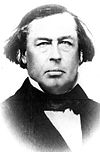
|
James Van Ness | July 1, 1855 | July 7, 1856 | Democratic | |
| 8 | 
|
George J. Whelan | July 8, 1856 | November 14, 1856 | American | |
| 9 | 
|
Ephraim Willard Burr | November 15, 1856 | October 2, 1859 | American | |
| 10 | 
|
Henry F. Teschemacher | October 3, 1859 | June 30, 1863 | Populist | |
| 11 | 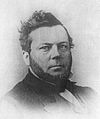
|
Henry Perrin Coon | July 1, 1863 | December 1, 1867 | Populist | |
| 12 | 
|
Frank McCoppin | December 2, 1867 | December 5, 1869 | Democratic | |
| 13 | 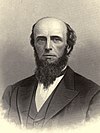
|
Thomas Henry Selby | December 6, 1869 | December 3, 1871 | Republican | |
| 14 | 
|
William Alvord | December 4, 1871 | November 30, 1873 | Republican | |
| 15 | 
|
James Otis[a] | December 1, 1873 | October 30, 1875 | Populist | |
| 16 | 
|
George Hewston[a] | November 4, 1875 | December 5, 1875 | Democratic | |
| 17 | 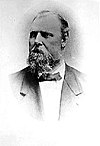
|
Andrew Jackson Bryant | December 6, 1875 | November 30, 1879 | Populist | |
| 18 | 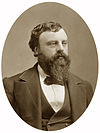
|
Isaac Smith Kalloch | December 1, 1879 | December 4, 1881 | Workingmen's | |
| 19 | 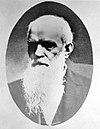
|
Maurice Carey Blake | December 5, 1881 | January 7, 1883 | Republican | |
| 20 | 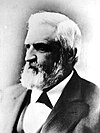
|
Washington Bartlett | January 8, 1883 | January 2, 1887 | Democratic | |
| 21 | 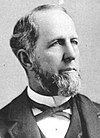
|
Edward B. Pond | January 3, 1887 | January 4, 1891 | Democratic | |
| 22 | 
|
George Henry Sanderson | January 5, 1891 | January 3, 1893 | Republican | |
| 23 | 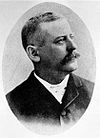
|
Levi Richard Ellert | January 3, 1893 | January 6, 1895 | Republican | |
| 24 | 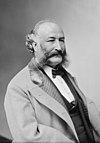
|
Adolph Sutro | January 7, 1895 | January 3, 1897 | Populist | |
| 25 | 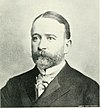
|
James D. Phelan | January 4, 1897 | January 7, 1902 | Democratic | |
| 26 | 
|
Eugene Schmitz[b] | January 8, 1902 | July 8, 1907 | Union Labor[17] | |
| 27 | 
|
Charles Boxton[b] | July 9, 1907 | July 16, 1907 | Union Labor | |
| 28 | 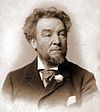
|
Edward Robeson Taylor[b] | July 16, 1907 | January 7, 1910 | Democratic | |
| 29 | 
|
P. H. McCarthy | January 8, 1910 | January 7, 1912 | Union Labor | |
| 30 | 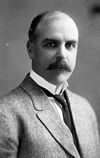
|
James Rolph[c] | January 8, 1912 | January 6, 1931 | Republican | |
| 31 | 
|
Angelo Joseph Rossi[c] | January 7, 1931 | January 7, 1944 | Republican | |
| 32 | 
|
Roger Lapham | January 8, 1944 | January 7, 1948 | Republican | |
| 33 | 
|
Elmer Robinson | January 8, 1948 | January 7, 1956 | Republican | |
| 34 | 
|
George Christopher | January 8, 1956 | January 7, 1964 | Republican | |
| 35 | 
|
John F. Shelley | January 8, 1964 | January 7, 1968 | Democratic | |
| 36 | 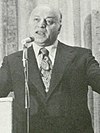
|
Joseph Alioto | January 8, 1968 | January 7, 1976 | Democratic | |
| 37 | 
|
George Moscone[d] | January 8, 1976 | November 27, 1978 | Democratic | |
| 38 | 
|
Dianne Feinstein[d] | December 4, 1978 | January 7, 1988 | Democratic | |
| 39 | 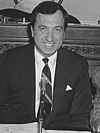
|
Art Agnos | January 8, 1988 | January 7, 1992 | Democratic | |
| 40 | 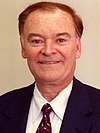
|
Frank Jordan | January 8, 1992 | January 7, 1996 | Democratic | |
| 41 | 
|
Willie Brown | January 8, 1996 | January 7, 2004 | Democratic | |
| 42 | 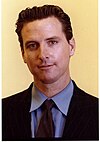
|
Gavin Newsom[e] | January 8, 2004 | January 10, 2011 | Democratic | |
| 43 | 
|
Ed Lee[e][f] | January 11, 2011 | December 12, 2017 | Democratic | |
| 44 | 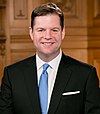
|
Mark Farrell[f] | January 23, 2018 | July 11, 2018 | Democratic | |
| 45 | 
|
London Breed | July 11, 2018 | Incumbent | Democratic | |
Notes
[edit]- a Otis died in office due to diphtheria. Supervisor George Hewston became acting mayor until Andrew Bryant was elected to the office.[18][19]
- b Schmitz was convicted of extortion and sentenced to 5 years in prison. The Board of Supervisors replaced Schmitz with Supervisor Charles Boxton who had also taken bribes. Boxton served for eight days before he resigned. The Board then replaced Boxton with Edward Taylor.[20][21]
- c Rolph resigned to become the Governor of California. The Board replaced Rolph with Angelo Rossi.[22]
- d Moscone was assassinated by former Supervisor Dan White. Supervisor and Board President Dianne Feinstein was named acting mayor.[23] She served the remainder of Moscone's term and was subsequently elected to two full four-year terms on her own.[24]
- e Newsom resigned to become the Lieutenant Governor of California. Supervisor and Board President David Chiu briefly served as acting mayor until city administrator Ed Lee was unanimously appointed on the following day by the Board to finish out Newsom's term.[25]
- f Lee died in office due to cardiac arrest. Board of Supervisors President London Breed served as acting mayor until January 23, 2018, when Supervisor Mark Farrell was appointed interim mayor by the Board of Supervisors.[26][27]
References
[edit]- General
- "San Francisco Mayors". City and County of San Francisco. Archived from the original on December 3, 2003. Retrieved September 3, 2009.
- "San Francisco Mayors". San Francisco Public Library. Retrieved March 11, 2009.
- "Agnos Is Mayor No. 39, Archivist Confirms". San Francisco Chronicle. Hearst Communications Inc. December 10, 1987. p. A 16.
- "City and County of San Francisco Municipal Code". City and County of San Francisco. 1996. Archived from the original on September 29, 2008. Retrieved March 11, 2009.
- Specific
- ^ a b c "San Francisco Charter Code, EXECUTIVE BRANCH – OFFICE OF MAYOR § 3.101. TERM OF OFFICE". charter.sanfranciscocode.org. Archived from the original on February 15, 2016. Retrieved January 15, 2016.
{{cite web}}: CS1 maint: unfit URL (link) - ^ Coy, Owen Cochran (1919). Guide to the County Archives of California. Sacramento, California: California Historical Survey Commission. p. 409.
- ^ "Rules dictate how SF's next mayor may be chosen and how long they may serve". San Francisco Chronicle. December 12, 2017. Retrieved December 12, 2017.
- ^ Fracassa, Dominic (June 13, 2018). "Mark Leno concedes SF mayor's race to London Breed". San Francisco Chronicle. Retrieved June 12, 2018.
- ^ Moench, Mallory (November 9, 2022). "S.F. Mayor Breed gets an extra year in office due to election year change. Why isn't she a fan of it?". San Francisco Chronicle. Archived from the original on February 21, 2024.
- ^ California Constitution art. II, § 6 (a) Archived October 8, 2010, at the Wayback Machine
- ^ Gordon, Rachel (August 21, 2003). "Judge denies instant election runoff". San Francisco Chronicle. Hearst Communications Inc. Archived from the original on January 13, 2006. Retrieved June 29, 2009.
- ^ Murphy, Dean E. (September 30, 2004). "New Runoff System in San Francisco Has the Rival Candidates Cooperating". The New York Times. Retrieved June 26, 2009.
- ^ Wildermuth, John (November 7, 2007). "Counting S.F. ballots will take a record amount of time". San Francisco Chronicle. Hearst Communications Inc. Archived from the original on June 4, 2011. Retrieved June 27, 2009.
- ^ a b Amy Graff, Here's what San Francisco's highest-paid workers make: 1 tops $500K salary, 9 make more than mayor, San Francisco Chronicle (July 11, 2017).
- ^ Riley McDermid, It's official: Ed Lee is America's highest-paid big city mayor, San Francisco Business Times (January 13, 2017).
- ^ Carl Nolte, Brown's Idea For S.F. 'Camp David' / Navy mansion catches his eye, San Francisco Chronicle (March 5, 1996).
- ^ Rick Hampson, Mayoral mansions have mixed track record, USA Today (December 11, 2013).
- ^ City and County of San Francisco Municipal Code art. XIII § 101.5
- ^ Starr, Kevin (1997). The Dream Endures: California Enters the 1940s. Oxford University Press US. pp. 115–117. ISBN 0-19-510079-4.
- ^ Nolte, Carl (April 25, 1999). "A Roaring Decade, A Glorious New City, A Rival to the South". San Francisco Chronicle. Hearst Communications Inc. Archived from the original on December 15, 2007. Retrieved July 3, 2009.
- ^ "Eugene E. Schmitz (1864–1928)". Virtual Museum of the City of San Francisco. Archived from the original on October 24, 2008. Retrieved March 13, 2009.
- ^ Egan, Ferol (1998). Last bonanza kings: the Bourns of San Francisco. University of Nevada Press. pp. 168–169. ISBN 0-87417-319-1.
- ^ Proceedings of the California Academy of Sciences. California Academy of Sciences. 1893. p. 365.
- ^ Bean, Walton (1952). Boss Ruef's San Francisco: the story of the Union Labor Party, big business, and the graft prosecution. University of California Press. pp. 227–230. ISBN 0-520-00094-3.
- ^ Nolte, Carl (November 6, 2007). "Exhibition spotlights career of 'totally forgotten mayor' Taylor". San Francisco Chronicle. Hearst Communications Inc. Archived from the original on October 22, 2012. Retrieved March 13, 2009.
- ^ "San Francisco Race Close" (PDF). The New York Times. November 5, 1931. Retrieved March 13, 2009.[dead link]
- ^ Sward, Susan (November 26, 1998). "Moscone's Time Was Anything But Quiet". San Francisco Chronicle. Hearst Communications Inc. Archived from the original on January 22, 2011. Retrieved March 12, 2009.
- ^ Gordon, Rachel (November 26, 2008). "Feinstein recalls S.F.'s 'day of infamy'". San Francisco Chronicle. Hearst Communications Inc. Archived from the original on February 15, 2009. Retrieved March 14, 2009.
- ^ "Ed Lee becomes the city's first Chinese American mayor". San Francisco Chronicle. Hearst Communications Inc. January 11, 2011. Retrieved January 11, 2011.
- ^ "Ed Lee, San Francisco's First Asian-American Mayor, Dies at 65". The New York Times. December 12, 2017. Retrieved December 12, 2017.
- ^ "SF Board of Supervisors name Farrell interim mayor — Breed voted down". San Francisco Chronicle. January 23, 2018. Retrieved January 23, 2018.


